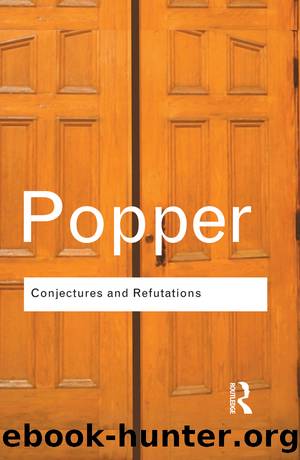Conjectures and Refutations by Karl Popper

Author:Karl Popper [Popper, Karl]
Language: eng
Format: epub
ISBN: 9781135971441
Publisher: Taylor and Francis
Published: 2018-08-25T22:00:00+00:00
IX
My last remarksâon (c)âindicate the direction in which, perhaps, an answer may be found to what I hold to be the most important aspect of our many-sided problem. Yet I do not wish to conclude this paper without making it quite clear that I believe that the problem can be taken further. Why, we could ask, are we at all successful in speaking about reality? Is it not true that reality must have a definite structure in order that we can speak about it? Could we not conceive of a reality which would be like a thick fogâand nothing else, no solids, no movement? Or perhaps like a fog with certain changes in itârather indefinite changes of light, for example? Of course, by my very attempt to describe this world I have shown that it can be described in our language, but this is not to say that any such world could be so described.
I do not think that, in this form, the question is a very serious one, but I also do not think that it should be too quickly dismissed. In fact, I believe that we are all most intimately acquainted with a world that cannot be properly described by our language which has developed mainly as an instrument for describing and dealing with our physical environmentâmore precisely, with physical bodies of medium size in moderately slow motion. The indescribable world I have in mind is, of course, the world I have âin my mindââthe world which most psychologists (except the behaviourists) attempt to describe, somewhat unsuccessfully, with the help of what is nothing but a host of metaphors taken from the languages of physics, of biology, and of social life.
But whatever the world to be described may be like, and whatever may be the languages we use, and their logical structure, there is one thing we can be sure of: as long as our interest in describing the world does not change, we shall be interested in true descriptions, and in inferencesâthat is to say, in operations which lead from true premises to true conclusions: in the application of logic to reality. On the other hand, there is certainly no reason to believe that our ordinary languages are the best means for the description of any world. On the contrary, they are probably not even the best possible means for a finer description of our own physical world. The development of mathematics, which is a somewhat artificial development of certain parts of our ordinary languages, shows that with new linguistic means new kinds of facts can be described. In a language possessing, say, five numerals and the word âmanyâ, even the simple fact that in field A there are 6 more sheep than in field B cannot be stated. The use of an arithmetical calculus permits us to describe relations which simply could not be described without it.
There are, however, further and possibly deeper problems concerning the relations between the means of description and the described facts. These relations are rarely seen in the right way.
Download
This site does not store any files on its server. We only index and link to content provided by other sites. Please contact the content providers to delete copyright contents if any and email us, we'll remove relevant links or contents immediately.
The remains of the day by Kazuo Ishiguro(7542)
Tools of Titans by Timothy Ferriss(6936)
The Black Swan by Nassim Nicholas Taleb(6184)
Inner Engineering: A Yogi's Guide to Joy by Sadhguru(5887)
Giovanni's Room by James Baldwin(5872)
The Way of Zen by Alan W. Watts(5790)
The Six Wives Of Henry VIII (WOMEN IN HISTORY) by Fraser Antonia(4784)
The Power of Now: A Guide to Spiritual Enlightenment by Eckhart Tolle(4749)
Astrophysics for People in a Hurry by Neil DeGrasse Tyson(4614)
Asking the Right Questions: A Guide to Critical Thinking by M. Neil Browne & Stuart M. Keeley(4566)
12 Rules for Life by Jordan B. Peterson(3724)
The Ethical Slut by Janet W. Hardy(3494)
Skin in the Game by Nassim Nicholas Taleb(3456)
Housekeeping by Marilynne Robinson(3396)
The Art of Happiness by The Dalai Lama(3378)
Double Down (Diary of a Wimpy Kid Book 11) by Jeff Kinney(3267)
Skin in the Game: Hidden Asymmetries in Daily Life by Nassim Nicholas Taleb(3259)
Walking by Henry David Thoreau(3228)
12 Rules for Life: An Antidote to Chaos by Jordan B. Peterson(3196)
